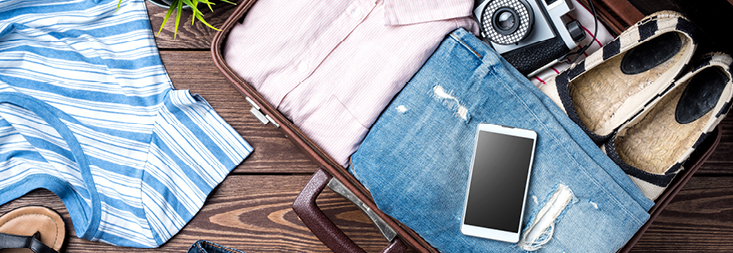
Puffer jackets or breezy tank tops? Flannel pants or flowy skirts? How about both? Whether you're first time travelers or a frequent mile's flyer, the question that always pops up when planning a trip is what clothes to pack.
The answer is not always so simple - dressing for a travel destination isn’t just a factor of the weather conditions. Planned activities and cultural considerations are additional elements to be taken in consideration.
Thankfully, we're here to simplify the question, and the answer. Read the full guide to Israel's dress code before throwing in every single piece of clothing you have in the closet.
Dress code in the Holy Places
Put off thy shoes from off thy feet, and put on thy clothes on thy shoulders.
The Western Wall, the Church of the Holy Sepulchre, Al-Aqsa Mosque - Israel is a land of significance to many religions. It is the home to some of the world's most revered holy sites.
For both men and women, it's advisable to cover shoulders, cleavage, and knees. That shouldn't be a problem in winter, as weather in Jerusalem, Safed and Tiberias, the main hubs of holy sites, is usually cold enough to warrant a jacket.
Summer on the other hand, that's a different story. The hot and humid weather calls for breathable, usually short clothing. Carrying a scarf or a light shawl in your bag can serve as a great way to quickly adapt to the dress code when entering sacred spaces.
Weather the storm - Dressing for Israel's Climate
When it comes to the Israeli summer, it's safe to say you can always count on it being hot. From May to October, anywhere you go, the temperatures start from 24 Celsius in the early morning and can reach up to 30 degrees and more. In areas like Eilat, Tiberias and the dead sea, temperatures are usually higher, and can reach to 45 degrees in the summer.
Add to that the high percentage of humidity in the coastal areas, you get the perfect weather for a beach. Make sure to pack your bathing suit and some short, breathable clothing in your suitcase.
In contrast, the cooler months of fall and spring, from October to December and March to May, bring milder temperatures and a fresh breeze. Layering becomes key during this time, as mornings and evenings can be cooler while afternoons are warmer.
Winter in Israel, particularly in December, is relatively mild in comparison to many other places. Jerusalem and the north parts of Galilee and Golan Heights can experience occasional rain and even snow, while coastal cities like Tel Aviv remain relatively temperate. Packing a mix of light and warm layers, waterproof outerwear, and comfortable shoes for walking through the occasional rain gets you the best of both worlds.
Adventure awaits
When it comes to dressing for your Israeli adventure, versatility is key. If you're planning a day at the beach in coastal cities like Tel Aviv and Eilat, swim suits and flip-flops are your go-to options.
When you're ready to explore the vibrant city life, like in bustling Haifa or historic Jerusalem, opt for casual clothing – jeans, shorts, and airy tops. Comfortable walking shoes are a lifesaver as you navigate the city's bustling streets and historic neighborhoods. Regardless of the weather, when visiting some of the more religious neighborhoods of Jerusalem and Safed it's advisable to consider the cultural aspect.
For those planning to explore Israel's nature and hike its diverse trails, the right clothing can make a difference. From the Golan heights and Galilee, in the north to the Negev desert, hats and lightweight clothing are your best option to stay cool and dry. The hot summer sun can be scorching at spring and summer, so long light clothing might help you keep your skin safe during a hike. Depending on the season, fleece jackets are a welcome addition.
Weather-Related Health Concerns
Looking good and feeling good often go hand in hand. The right clothing can also reduce risks to health issues related to weather, like heat strokes, dehydration and hypothermia.
In Israel, health issues related to warm weather, like heat strokes, are more likely. Best to prepare breathable clothing, drink plenty of water and seek shade during peak sun hours.
However, it's easy to get carried away and forget to protect ourselves from the heat or the cold. Whether you're facing a heat stroke, dehydration, sunburn or any weather or non-weather-related health issue, Harel's Tour & Care tourist health insurance* offers access to medical care and support, providing not only financial protection but also guidance in navigating the local healthcare system. Harel's Tour & Care tourist health insurance can assist you in finding doctors and medical facilities, allowing you to get medical care quickly and efficiently.
What you wear isn't just about looking good – it's about feeling comfortable and respecting the local culture. Whether you're visiting important sites or enjoying the different weather,
the right clothes can make a big difference. Stay cool in the heat, stay warm in the cool, and above all stay safe and healthy to make the most out of your journey.
Can't wait to tour Israel? Let us take care of
you >>>
* The full and binding conditions are detailed in the policy. In any case of a contradiction between the aforementioned and the terms of the policy, the terms of the policy will prevail. Joining the insurance is subject to the Harel's medical underwriting policy.





